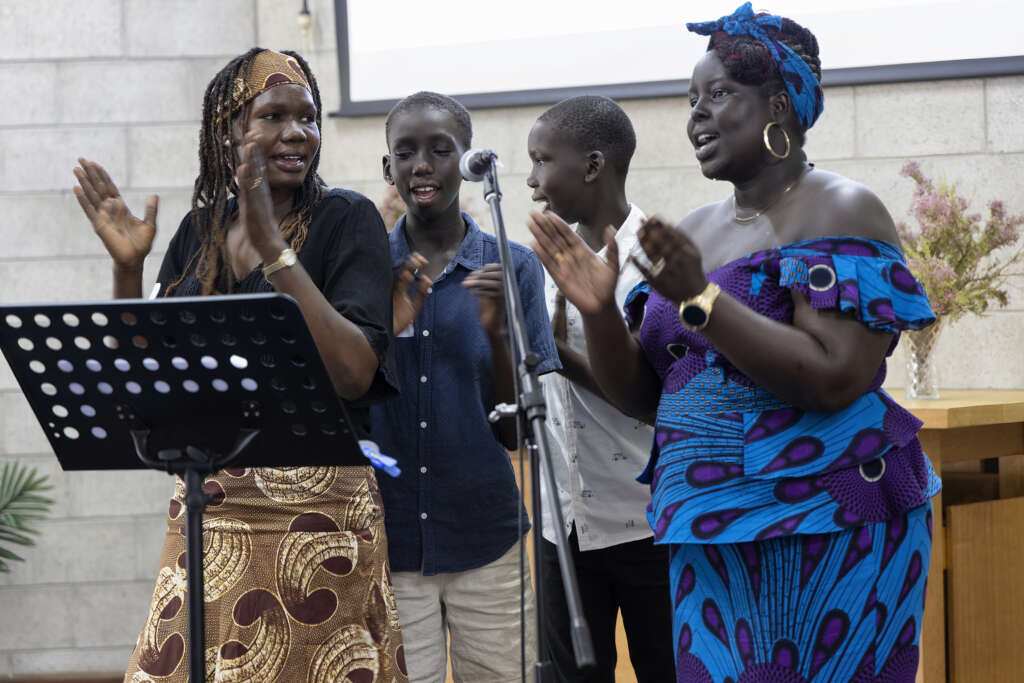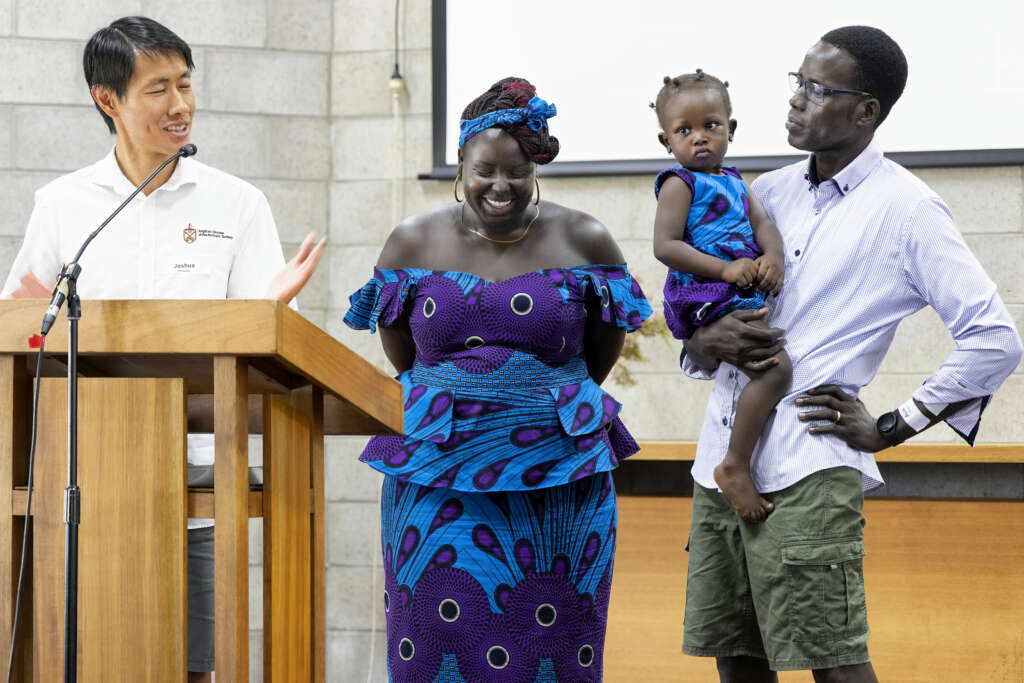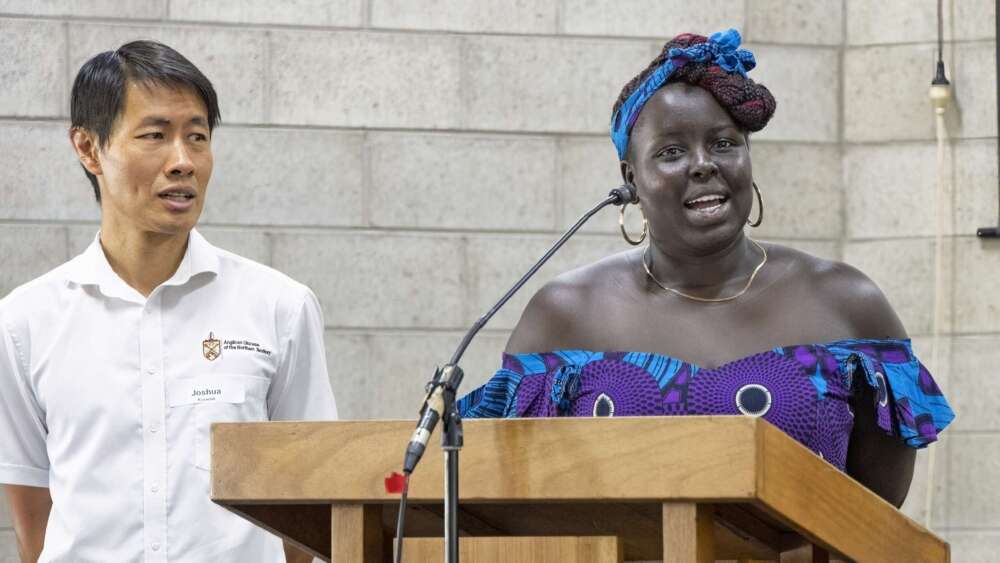Apajok Biar’s school principal predicted that she would become the first woman of colour to be an Australian prime minister, after his Year 12 student came back bubbling with excitement about her experiences attending a Multicultural Youth Leadership Summit in Sydney.
“I said, ‘That’s quite ambitious of you, but it sounds great!” recalls the social worker turned human rights advocate who is based in Alice Springs.
Born in a refugee camp in Kenya, this fast-talking South Sudanese dynamo came to Australia with her family as a curious two-year-old toddler. Now 27 years of age, she may not yet be prime minister. Still, she has made a name for herself as a fierce advocate for women and children, those who have been through a refugee experience and other humanitarian causes.
She was just 22 when she first went to Geneva to attend the United Nations High Commission for Refugees (UNHCR) to discuss youth involvement in any issue that affects them.
Apajok and her husband Ajak Akech, along with their two small children Akuek, two, and Agruin, nine months, recently spent eight months in Darwin, where they attended St Peter’s Anglican Church in Nightcliff.
The family came to Darwin so that Ajak – who comes from the same area of South Sudan and through the same refugee camp as Apajok – could train as a police officer. Now they are back in Alice Springs, where they are members of the Church of the Ascension. As a new Constable, Ajak is working with disengaged youth, while Apajok is working as a social worker at Alice Springs Hospital and consulting with Multicultural Community Services of Central Australia, running a women’s program every second weekend.

Apajok Biar, right, sings a song in her heart language of Dinka with other South Sudanese Christians at St Peter’s Nightcliff.
She is also on the boards of the Central Australian Women’s Legal Service and the Women’s Museum of Australia, where she is leading the planning of the annual International Women’s Day event.
Though she was mainly looking after her children in Darwin, Apajok spent her nights there working internationally.
“Some of the changes that came during COVID, such as working from home, were positive ones for me,” she says.
With COVID finally settling down, Apajok was able to go to Geneva again – twice – in June.
During her first visit, she was elected the chairman of the Asia Pacific Refugee Rights Network focus group on gender. During her second visit, she took part in UNHCR Annual Tripartite Consultations on Resettlement (ATCR) as a member of the Refugee Advisory Board on refugee resettlement to UNHCR.
All of this high-profile work came about from Apajok’s passionate faith and sense of justice, which first found expression in a Christian network called South Sudan Voices of Salvation, a not-for-profit youth-run and led organisation that raised money to relieve the famine in South Sudan.
“I ended up sitting down for 30 days straight in my school holidays and did all the paperwork for the constitution and the registration of the organisation. And then, I found myself going to most states to do fundraising events. We established teams in each state who were running the show and I’d just go and support on the days of the fundraising. And we ended up raising about $5,000 in Sydney, $5,000 in Canberra, $5,000 in Queensland, $2500 in Perth and $2500 in Victoria.”
“My expectation was I had to be 35-plus to be a leader or to make changes in the community.”
According to Apajok, her lightbulb moment came during that pivotal youth leadership forum when she was in Year 12, which her principal had twisted her arm to attend.
“I saw young kids who looked like me, who were changing circumstances in their communities, which for me was revolutionary because growing up in my community, the leaders didn’t look like me – my expectation was I had to be 35-plus to be a leader or to make changes in the community or to change anything that I want to change. I go to this summit and see young people changing things in government, in their local communities, internationally – it was amazing.”
Riled by the inaction of police after several South Sudanese men were killed across Australia and the police ruled their deaths as suicides, Apajok sprang into action.
“I just started volunteering in the community, in refugee youth programs and school holiday programs in a local community organisation,” she says.

Josh Kuswadi, left, with Apajok Biar and her husband Ajak Akech and daughter Akuek
Growing up in the heavily Anglo-Saxon Sutherland Shire in Sydney, Apajok had experienced “microaggressions” because of her race, but she was shocked by her first experience of overt racism while waiting on a train station platform during her second year at uni.
“I had recently been on the front page of The Leader for the organisation that I’d started, and then this man just spat at me and started swearing at me and telling me to go back to where I came from and being quite aggressive. I looked at him and no one did anything. It made me feel scared,” she says.
“But it got things turning, like ‘Why would you do that?’ So then talking to my mentor at the time, who was the leader of the community organisation there, we concluded that it was xenophobia – you’re scared of what you don’t know – so then we started a couple of programs.”
Apajok started visiting local schools and educating the Year 8s about refugees – who they are, where they come from and why racism isn’t cool.
“I was sharing my experiences and it became like, ‘What did you do, Miss? Did you punch him?’ ‘No, I didn’t punch him.’ ‘Why? You should have punched him!’ I was like, ‘No, that’s what he would’ve wanted. He wanted me to fulfil his expectations for me, right?’”
She then created a DVD called Everyone Comes from Somewhere, which contains eight videos about the experiences of diverse migrants in the Shire, which was distributed to schools and adopted into the English syllabus.
“It was a phenomenal thing that I think the whole of Australia needs to adopt in every city.”
After gaining a Bachelor of Social Work from Western Sydney University, Apajok worked for Cumberland Council, where she helped set up the award-winning project, Refugee Camp in my Neighbourhood – which was a simulation of a refugee camp in which people live in UNHCR tents, have ration cards for food and have to fill out registration papers as in a refugee camp.
“It was a phenomenal thing that I think the whole of Australia needs to adopt in every city because you are going through the experiences of refugees and asylum-seekers and the tour guides who are narrating these stories that you going through have experienced that. You’re learning from their experience and I think that’s the best way to change minds and hearts,” she says.
Her work with UNHCR began in 2017 when she went on a scholarship to Geneva as a refugee youth leader for Australia and New Zealand. This came about through her volunteer work with an organisation called MYAN – Multicultural Youth Advocacy Network – which consulted with young people all over Australia.
“Honestly, we sat down with them and asked them what they think. They were so intelligent, we just hung off them and we came up with these seven recommendations and the High Commissioner took these recommendations on board. The next year, when I got to go on a scholarship, we launched the Global Refugee Youth Council to the UNHCR.”
To ensure that young refugees have a voice at the table in any discussion that affects them, she joined the Gender Audit team of UNHCR as a refugee women’s representative, which involves attending UNHCR meetings and auditing everything that is said.
“Barack Obama launched the UNHCR Comprehensive Refugee Response Framework in 2016, which provides for an international accountability of refugees,” she explains. “Let’s not just leave it to governments, let’s not just leave it to host communities, let’s have a whole society approach. So when he adopted that, 149 countries signed on to it. Over the next three years, there were meetings of governments discussing how we implement these in our countries. So attending these meetings and making sure that issues of women and girls were not missed out was so important.”
Apajok says only 2 per cent of the panellists in her first meeting were women and less than 20 per cent of the statements included women. “Ongoing advocacy changed that [percentage of statements] to having more than 70 per cent, which is really encouraging.”
“Sexual gender-based violence is on the rise, even during COVID. The UN Women agency has called it the second pandemic.”
I ask Apajok what has made her so passionate about gender equity.
“I think it is the realisation that if women and girls are not included at the table, then our issues aren’t discussed – they’re just kind of normalised. It’s expected that the same issues that men have are the same issues we have, but it’s not always the case. And unfortunately, sexual gender-based violence is on the rise, even during COVID. The UN Women agency has called it the second pandemic. And if we’re not advocating about it or actively addressing it, then we’re ignoring it and then women are suffering, and it shouldn’t be normalised. I think we should be addressing it actively.”
As a wife and mother, Apajok scoffs at my suggestion that she doesn’t appear to have been restricted by her gender.
“Of course I have! In my community, young women don’t have a space to speak. So if I go to a meeting, people wouldn’t even ask me for my opinion – they would ask my husband. So it’s making those spaces available. They’re not always made available for us; doors aren’t always open for us, so we have to kind of fight our way through.”
“Doors aren’t always open for us, so we have to kind of fight our way through.”
I ask Apajok what role her faith plays in the way she approaches these issues.
“It’s everything; it’s coming from a lens of compassion. I was born in a refugee camp, but my circumstances cannot define my future because I’m loved by Christ and that is what I want to share. I want to show people that your circumstances don’t determine your future because Christ has given us grace, and that’s an impression we want to show people when we give them a helping hand. It’s saying, ‘I’m helping you not out of my strength, but it’s because Jesus helped me.’ And we have a responsibility to help others.”
I ask her if she is satisfied with the progress being made or if she finds it frustrating how slowly things change.
“I want to show people that your circumstances don’t determine your future, because Christ has given us grace.”
“I’ve been grateful that I’ve had mentors from who I learned that progress comes in all shapes and forms. In my first three years [in Geneva], we saw progress, which is fantastic. Now it’s slow and steady, but we will win some of the races, which is good. And just like giving it to God because I can paddle as hard as I can, but if he’s not moving, he’s not going to move. Before every speech, every engagement, it’s like, ‘We give this platform to you.’”
Email This Story
Why not send this to a friend?


